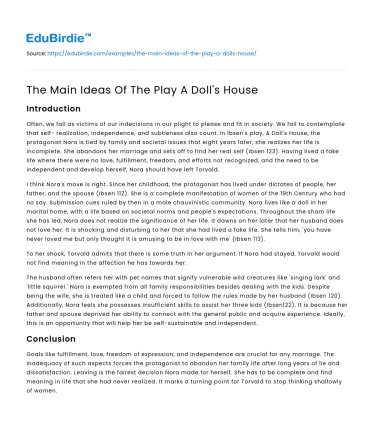Table of contents
- Introduction
- Conclusion
- Work Cited
Introduction
Often, we fall as victims of our indecisions in our plight to please and fit in society. We fail to contemplate that self- realization, independence, and subtleness also count. In Ibsen's play, A Doll's House, the protagonist Nora is tied by family and societal issues that eight years later, she realizes her life is incomplete. She abandons her marriage and sets off to find her real self (Ibsen 123). Having lived a fake life where there were no love, fulfillment, freedom, and efforts not recognized, and the need to be independent and develop herself, Nora should have left Torvald.
I think Nora's move is right. Since her childhood, the protagonist has lived under dictates of people, her father, and the spouse (Ibsen 112). She is a complete manifestation of women of the 19th Century who had no say. Submission cues ruled by then in a male chauvinistic community. Nora lives like a doll in her marital home, with a life based on societal norms and people's expectations. Throughout the sham life she has led, Nora does not realize the significance of her life. It dawns on her later that her husband does not love her. It is shocking and disturbing to her that she had lived a fake life. She tells him, 'you have never loved me but only thought it is amusing to be in love with me' (Ibsen 113).
To her shock, Torvald admits that there is some truth in her argument. If Nora had stayed, Torvald would not find meaning in the affection he has towards her.
The husband often refers her with pet names that signify vulnerable wild creatures like 'singing lark' and 'little squirrel.' Nora is exempted from all family responsibilities besides dealing with the kids. Despite being the wife, she is treated like a child and forced to follow the rules made by her husband (Ibsen 120). Additionally, Nora feels she possesses insufficient skills to assist her three kids (Ibsen122). It is because her father and spouse deprived her ability to connect with the general public and acquire experience. Ideally, this is an opportunity that will help her be self-sustainable and independent.
Conclusion
Goals like fulfillment, love, freedom of expression, and independence are crucial for any marriage. The inadequacy of such aspects forces the protagonist to abandon her family life after long years of lie and dissatisfaction. Leaving is the fairest decision Nora made for herself. She has to be complete and find meaning in life that she had never realized. It marks a turning point for Torvald to stop thinking shallowly of women.
Work Cited
- Ibsen, Henrik. A doll's house. A&C Black, 2008.






 Stuck on your essay?
Stuck on your essay?

